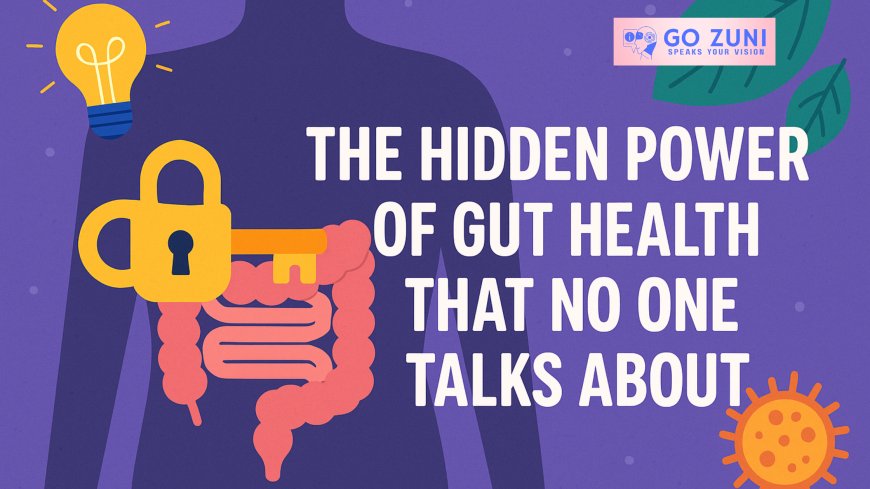When My Gut (Literally) Started Talking Back
Let’s rewind a few years. I was working remotely as an IT consultant, juggling 3 clients, and prepping for a new cloud certification exam. My days started with coffee and ended with Red Bull, and meals? Mostly “whatever’s in the fridge.”
Then, out of nowhere, I started getting hit with weird symptoms. I wasn’t sleeping well. I’d wake up tired, feel edgy for no reason, and had these moments where it felt like my brain just… glitched. I brushed it off as burnout. “I’m just overworked,” I kept telling myself.
But one day, during a Zoom call, I had what I can only describe as a mini anxiety attack. My heart was racing, my thoughts were jumbled, and I had to turn my camera off to collect myself. That was my wake-up call.
It wasn’t just stress. Something deeper was off. And surprisingly, it started with my gut health.
Gut Health and Mental Health: The Not-So-Obvious Connection
We tend to think of our stomach as just the place food goes. But it’s so much more than that.
The gut is often called the “second brain” because of how closely it interacts with your nervous system. It’s home to the gut microbiome, which is a bustling city of trillions of microbes—mostly bacteria—that influence digestion, immunity, inflammation, and yes, mood.
In fact, did you know that about 90% of your body’s serotonin (the neurotransmitter that regulates mood, sleep, and emotions) is actually produced in the gut? If your gut bacteria are out of balance—something scientists call dysbiosis—it can trigger inflammation, disrupt neurotransmitter production, and send stress signals to the brain.
It’s not woo-woo anymore. It’s biology.
The Gut-Brain Axis: When One Breaks, So Does the Other
There’s a highway that runs from your gut to your brain called the gut-brain axis. This communication system uses chemical messengers and neural pathways, including the vagus nerve, to relay what’s happening in your gut directly to your central nervous system.
When your gut microbiome is healthy and balanced, it sends calming, stabilizing signals to your brain. But when it’s inflamed, out of whack, or compromised (think high sugar diets, antibiotics, stress, processed foods), it can do the opposite—causing or worsening anxiety and depression.
What My Tech Lifestyle Was Doing to My Gut
I started connecting the dots.
- Late nights and poor sleep? Disrupted my gut rhythm.
- Too much caffeine and not enough hydration? Dehydrated and inflamed my gut lining.
- Fast food and skipping meals? Starved the good bacteria, fed the bad.
- Stress? Spiked cortisol, which weakens the gut lining and immune defenses.
All this was causing symptoms I thought were just “mental,” when in fact, they were rooted in poor gut health.
So, I made some changes.
How I Started Rebuilding My Gut (and My Mind)
1. I Cleaned Up My Diet
I reduced sugar, processed foods, and artificial sweeteners, which are known to feed bad bacteria. Instead, I started eating fermented foods for gut health—like sauerkraut, kefir, miso, and kimchi. These are packed with natural probiotics.
2. I Took Probiotics for Gut Health
Not all probiotics are equal. I did my homework and found a digestive health supplement with strains like Lactobacillus and Bifidobacterium, both of which have been studied for supporting mental wellness and healing the gut lining (yes, that’s probiotics for leaky gut, too).
3. I Slowed Down and Slept More
Gut bacteria operate on a rhythm—just like we do. Better sleep and lower stress allowed them to repopulate and thrive. I even started meditating (shocking, I know), and it made a difference.
4. I Got Outside and Moved
Daily walks didn’t just clear my head—they improved my digestion and boosted microbiome diversity. Who knew sunlight and a stroll could help with both brain fog and bloating?
So… Can Poor Gut Health Really Cause Anxiety and Depression?
The answer: absolutely, yes.
Poor gut health might not be the only cause, but it’s often a major contributing factor—especially in people with chronic stress or demanding tech jobs.
Studies have found that people with depression and anxiety often show signs of gut imbalance—low diversity, inflammation, or leaky gut syndrome. Improving their microbiome with diet, probiotics for gut health, and lifestyle shifts often leads to reduced symptoms.
It’s not just about mental health either. Fixing your gut often improves sleep, focus, energy, and even skin. It’s like upgrading your operating system—except this one runs both your mind and body.
Don’t Ignore the Gut When Debugging the Mind
If you’re in IT, tech, or any high-performance field, it’s easy to default to solving problems with logic and tools. But your body—and your gut—doesn’t run on code. It runs on connection, nourishment, and balance.
So if you’re feeling foggy, anxious, or just not yourself, don’t just upgrade your app stack. Start with your gut.
Try This: Your 5-Day Gut-Health Reset
Want a quick start? Here’s what helped me:
- Morning: Warm water with lemon + probiotic capsule
- Lunch: Add a fermented food (yogurt, kimchi, miso soup)
- Snacks: Cut refined sugar, replace with fruit or nuts
- Dinner: Fiber-rich meals—think lentils, sweet potatoes, leafy greens
- Night: Tech off 1 hour before bed + 7–8 hours of sleep
Give it five days. Track how you feel. You might just be amazed.
Final Thoughts: Your Gut Deserves a Seat at the Table
Mental health is complex. But if there’s one thing I’ve learned, it’s this: when you take care of your gut health, your mind often follows.
It’s not about trendy diets or magic pills. It’s about understanding that your brain doesn’t operate in isolation—and neither should you.
As someone who once thought a bug fix could solve anything, I’ve learned that healing isn’t always technical. Sometimes, it’s biological. And often, it starts in the gut.
